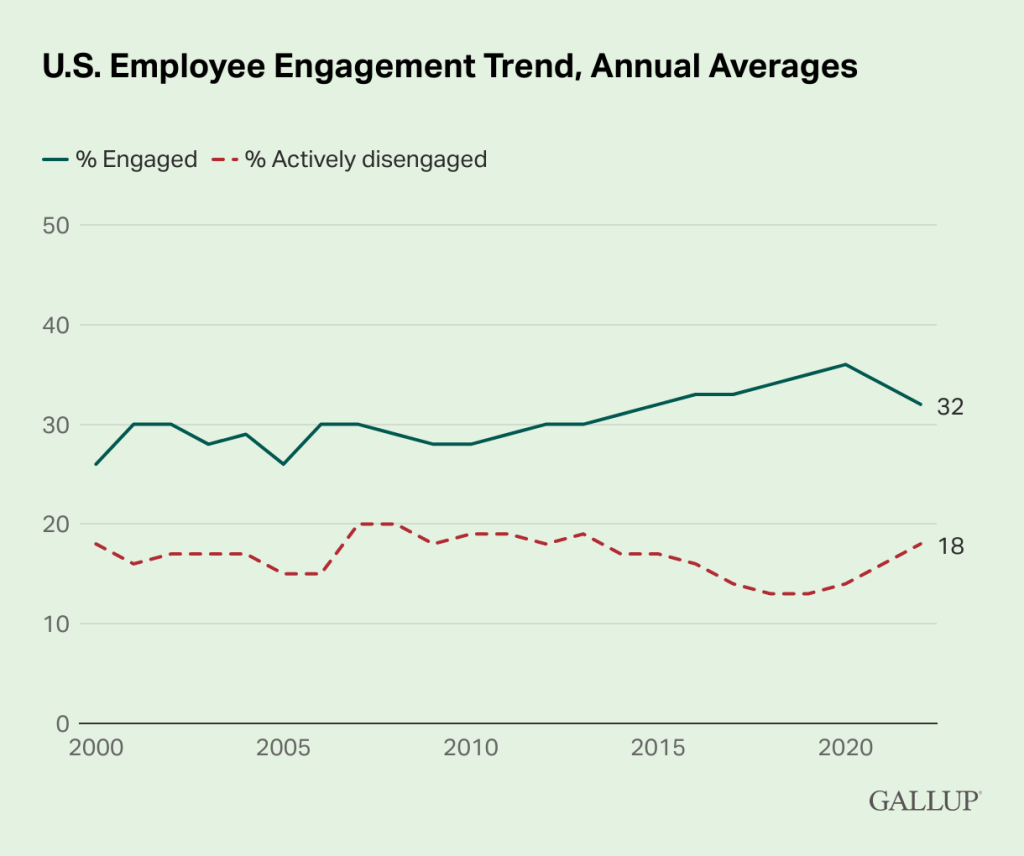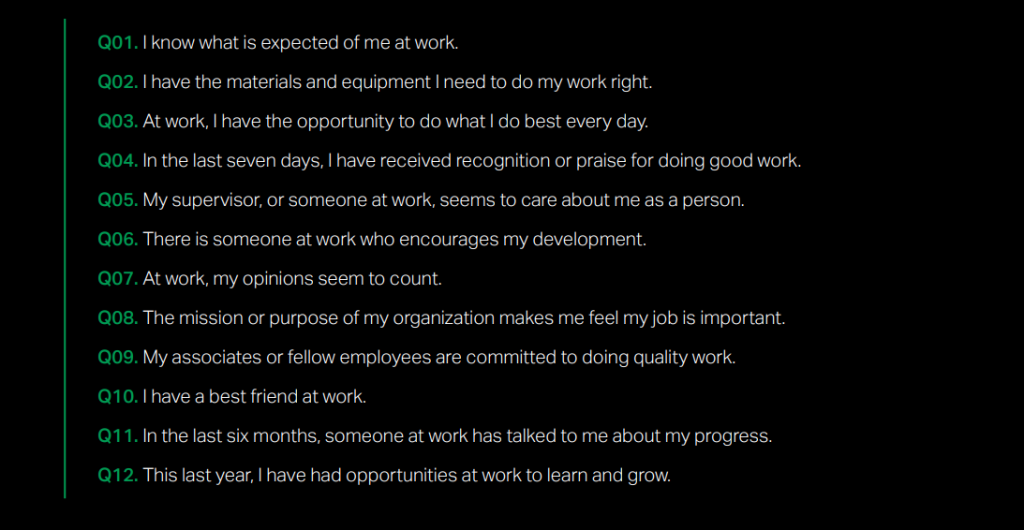Gallup: Globally, 79% of employees are either not engaged or are actively disengaged at work
I’m sure you’ve heard the term quiet quitting by now, it has been popping out in the media and on our social media feeds since the beginning of this year’s summer.
On TikTok especially there are over 140 million views of #quietquitting videos at the time of writing.
Quiet quitting refers to employees doing the work that is in their job description and not going above and beyond for their employer as they have done previously.

The various meanings of quiet quitting
Some creators are talking about “Act your wage, ” a slogan that has been gaining momentum lately. It’s a creative wordplay that links the lack of going above and beyond to the amount written on the paycheck. It’s worth noting that managers are quiet quitting too with only 1 in 3 managers being engaged at work (source).
Other creators explain the quiet quitting trend by rejecting burnout, finding a healthy work/life balance and saying that they are no longer “subscribing to the hustle culture mentality that work has to be your life”.
Survey reports show that this trend has been growing especially among Gen-Z employees with polls on LinkedIn showing that quiet quitting is a strong indicator for employees eventually leaving the company and joining the Great Resignation, the trend that’s been sweeping the world for the past two years.
In my opinion, quiet quitting takes on different meanings depending on the industry and the job’s specifics. For some professionals, it’s not about staying late, working weekends or taking on work that is not in their job descriptions – unpaid work. This is not what is happening.
How ‘quiet quitting’ is hurting employers
It’s about losing the enthusiasm of being part of a greater mission, of knowing your work has a higher meaning and your contribution is appreciated. It’s about not offering solutions, not taking the initiative and coming up with fresh ideas on how to achieve business goals.
It’s about being passive and a Yes man. It’s about giving up and not caring if the business fails or succeeds. And it’s more dangerous for the employer because creativity and innovation stem from being proactive and saying what if we do this or I’ve been thinking about a new way to delight our customers or the x trend is coming, we need to prepare for it or I have an amazing idea for our next marketing campaign.
When you hear crickets at the next team meeting, know that your employees are quiet quitting and you are in the middle of a burning house.
But there’s still time to put out the fire.

Why quiet quitting is especially high among Gen Z employees and why employers should pay attention
The latest piece on quiet quitting doing the rounds on social media is this opinion article where the author says employees are not ‘quite quitting’, they are in fact working and suggests we use a new term: work for grown-ups.
The author says that both employers and employees should see the job as a “contractual relationship of mutual respect and clearly defined obligations “ and nothing more. And that employers shouldn’t concern themselves with whether or not employees “love them”, their work has a purpose, and all they need to know in terms of engagement is if they think their work is harming their health if they have a “decent line manager” and if they think they’re paid fairly.
My thoughts reading this were that the author is oblivious to key traits of employees in Gen Z who will make up 27% of the workforce by 2025 in OECD countries.
And also that we’re soooo past “decent line manager”. It’s not the 80s anymore!
I’ll mention just 3 traits influencing Gen Z’s outlook on work-life:
![]() They want to work for a company that fits their values
They want to work for a company that fits their values![]() Work-life balance and diversity in the workplace are paramount
Work-life balance and diversity in the workplace are paramount![]() They are expecting opportunities to learn and grow from the employer
They are expecting opportunities to learn and grow from the employer
Gen Z is influencing the future of work for everyone in the workforce (Are you concerned about how the future of work influences your workforce? Check this out!).
Now replace “loving” the company with having shared values, “harming their health” with having a healthy work/life balance and the “decent line manager” with a manager actively invested in their professional growth and we have a view closer to reality as employers.
How to stop quiet quitting in your company
The solution is to raise engagement.
HRs have been traditionally tasked with employee engagement.
Among Gallup’s findings shared in its 2022 report on employee engagement, one fact stands out:
Employee engagement is not HR’s job; it’s the manager’s.
Because the manager assigns the tasks to team members and knows the workload of every one of them, what are their strengths, what are they struggling with at work and their life outside of work.
The cause and the solution of quiet quitting is leadership. It’s time for people leading people.
How should managers nurture and maintain employee engagement?
Through ongoing coaching conversations with employees.
Here are Gallup’s recommendations:
![]() Managers must see engagement as one of their primary responsibilities;
Managers must see engagement as one of their primary responsibilities;![]() Managers must have one meaningful conversation per week with each team member — 15-30 minutes, to help employees reduce disengagement and burnout;
Managers must have one meaningful conversation per week with each team member — 15-30 minutes, to help employees reduce disengagement and burnout;![]() Employees must see how their work contributes to the organization’s larger purpose;
Employees must see how their work contributes to the organization’s larger purpose;![]() Managers need to create accountability for individual performance, team collaboration and customer value.
Managers need to create accountability for individual performance, team collaboration and customer value.
Gallup: 12 elements of employee engagement that predict high team performance in critical business outcomes including retention, productivity, safety, sales and revenue

Future of Work Strategy Expert @London Business School LYNDA GRATTON: Focus on your managers
Lynda Gratton is an award-winning Professor of Management Practice at the London Business School.
She designed the ‘Human Resource Strategy in Transforming Companies’ programme and has since led it for over 20 years. The programme is considered one of the world’s leading programmes on people and organisations.
Lynda Gratton has chaired the World Economic Forum Council on Leadership and is currently co-chair of the World Economic Forum Global Future Council on Work, Wages and Job Creation.
In her latest article for Harvard Business Review published in the March-April 2022 issue of the magazine, she stated the following findings:
![]() 75% of employees reported that the most stressful aspect of their jobs was their immediate boss
75% of employees reported that the most stressful aspect of their jobs was their immediate boss![]() weekly one-to-ones with managers during uncertain times have amazing results:
weekly one-to-ones with managers during uncertain times have amazing results:
54% increase in engagement,
31% increase in productivity,
15% decrease in burnout,
16% decrease in depression among employees
As the saying goes, people join companies and leave their managers.{…} Having good relationships with their managers is the top factor in employees’ job satisfaction, which in turn is the second-most-important determinant of their overall well-being.
Lynda Gratton
Managers’ role needs to change from traditional, performance management, to what today’s and tomorrow’s workforce needs, performance development.
Are you an employer? Now is the time to develop your managers’ leadership skills!
BRAND MINDS 2023 is the best business event for your managers.
Your team leaders will learn new strategies to grow employee retention and engagement from Future of Work Strategy Expert Lynda Gratton.
Human Resources managers who have sent their managers and teams to past editions of BRAND MINDS have noticed a significant increase in employee engagement and motivation.
The participants’ feedback is that BRAND MINDS is a great reward for their hard work and the acknowledgement that their employer cares for their professional growth and development.





















